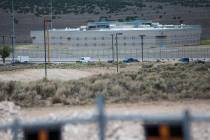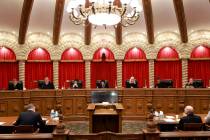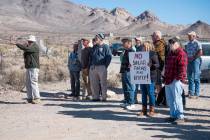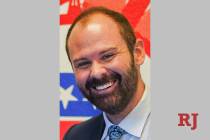Needed reforms may do little in short run
On Feb. 7, the Nevada Legislature will convene its 76th regular session. The issues facing lawmakers are daunting. Nevada leads the nation in unemployment, foreclosures and bankruptcy. It is $2.2 billion short of maintaining existing education, public safety and health care programs. It has a lower high school graduation rate than any other state in the union.
Legislators will have 120 days to tackle these challenges, and the most overused sound bite in Nevada is, "We can't let a good crisis go to waste."
For those who believe government can solve all of our problems if it only had the money to provide essential services, the Great Recession has exposed how failing to properly fund education, health care and infrastructure has reduced our competitiveness and quality of life.
At the other end of the spectrum are those who believe the way to fix government is to constrict it, with the Great Recession providing an excellent excuse to tighten the noose.
For most, the answer falls somewhere in between, with our individual points of view guided less by some enlightened vision for the future and more by the ever-present reality of what we have become. Politics and kitschy sound bites aside, action is needed not because we are in the midst of crisis, but in spite of it.
From an analyst's perspective, the discussion will likely begin with spending reform. This is not because government is too large, but because it is impossible to have a meaningful discussion of what governments need when there is a general belief existing funds are not being put to their best use.
Ready examples: The second-highest paid firefighters in the nation. Exceptionally generous retirement and health plans for public workers. Teachers trading larger class sizes for salary increases. Duplication of services and programs between governments.
Notably, many needed reforms will do little, if anything, to address the state's immediate fiscal crisis. Restructuring education to pay the best teachers more and remove the worst teachers from the classrooms or requiring newly hired public employees to work until they are at least 60 before they receive full retirement benefits are unlikely to save the state any money during the next two years.
Neither is amending the state collective bargaining statutes to open labor contracts automatically in the event of a fiscal emergency and making elected officials, as opposed to arbitrators, ultimately responsible.
They may, however, be the only thing that saves it over the next 20.
Next, we anticipate the state will turn its attention to economic development. Nevada has two very distinct economic development challenges. The first is finding jobs for the 186,000 people actively seeking employment; the second is diversifying the economy to reduce our dependence on the tourism and construction sectors.
Education may very well be the most important ingredient to longer-run economic prosperity, but improving education as a means of alleviating our immediate unemployment challenges is like using a typewriter to make a telephone call.
We need to recommit to economic development with the goal of not only attracting new businesses but also retaining and expanding those we have today. That said, economic development needs to be more a community imperative than a state initiative. Local business and industries have an incentive to attract high-quality suppliers, vendors or customers to the state.
In the near term, Nevada should take steps wherever possible to get people back to work. Construction and development workers account for one in every three displaced workers. Nevada remains behind in terms of its major infrastructure master plans as well as needed maintenance.
While construction for the sake of construction is bad public policy, investing in needed infrastructure provides jobs immediately, strikes at our unemployment base and leaves the state with long-term assets. Along these same lines, removing the barriers to public-private partnerships, eliminating tax sunsets for water and wastewater programs and facilitating export of power could also lead to near-term job creation.
At the same time we should remove any incentive for displaced workers to remain on unemployment rolls.
If we make Nevada a better place to live for our families or a better place to do business for our companies, new businesses and residents will follow. In the longer run, education will be key to economic development, as will focusing our efforts and resources to effectuating a community-based plan. This process and these reforms should be concurrent, not consecutive.
Finally, legislators in 2011 will likely undertake some degree of revenue reform. Existing revenue streams are insufficient to maintain services at current levels. For purposes of our internal analyses, we have been assuming a revenue neutral state budget for 2011-13 (i.e., one that holds expenditures and service levels constant).
Assuming roughly half the budget shortfall is addressed through reforms leaves a $1 billion to $1.5 billion state budget deficit.
Whether that shortfall is addressed through the reauthorization of taxes that are scheduled to sunset or adding a new revenue source, or whether it is mitigated by deeper budget cuts, the shortcomings of our state's fiscal system are clear, well-documented and worthy of consideration.
The task before legislators is overwhelming. Our worn boot leather is making it harder to kick the can down the road, and new faces, new ideas and new alliances will add to the process but make the learning curve steep. These challenges notwithstanding, there is little doubt that what the 76th Legislature does over the next six months will lay the foundation Nevada's growth and prosperity for the next 20 years.
Jeremy Aguero is the principal analyst for the Las Vegas firm Applied Analysis.
This is another in an occasional series in which community leaders offer state lawmakers their perspectives on the priorities of the 2011 legislative session, which begins next month in Carson City.























